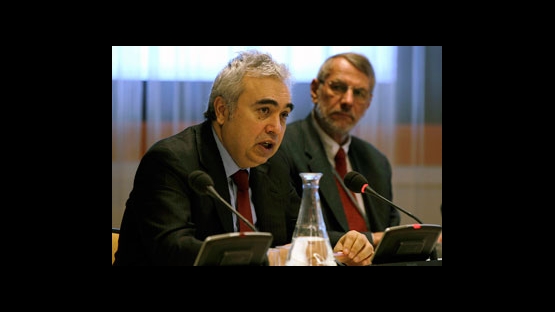Nuclear energy will continue to play a key role in global electricity production despite the Fukushima Daiichi Nuclear Power Plant accident, shows a recent report by the International Energy Agency (IEA).
"Nuclear's share of electricity generation will remain between 10.3% and 19.8% - by 2035," said Dr. Fatih Birol, IEA Chief Economist during a seminar hosted jointly by the International Atomic Energy Agency (IAEA) and the International Energy Agency (IEA) on 24 November 2011. The seminar included presentations on the IEA's recently released annual World Energy Outlook and the IAEA's nuclear projections published as Reference Data Series 1.
Birol's estimate is based on the likely scenario that countries with active nuclear power plant construction projects - such as China, India and South Korea - will continue with their programmes. Under the new policies scenario developed by the IEA, total nuclear energy output will rise by more than 70% until the year 2035. This estimate is only a slight decrease from last year's predictions.
The 2011 World Energy Outlook also examines a future characterized by a substantial shift away from nuclear power labelled "low-nuclear" scenario. It foresees that second thoughts on nuclear energy would have serious consequences for both climate change and energy security.
"A shift away from nuclear would increase the share of electricity produced by renewable sources," Dr. Birol said, "but it would even more increase the share of fossil fuels such as coal and natural gas, thus increasing import bills, reducing the diversity in the energy mix and increasing CO2 emissions."
"It would also put additional upward pressure on energy prices, raise additional concerns about energy security and make it more difficult and expensive to combat climate change," he added.
Dr. Hans-Holger Rogner, Head of the IAEA's Planning and Economic Studies Section, presented the IAEA's nuclear energy projections prepared in June 2011. "We have seen the use of nuclear power contested after Fukushima in Germany, new builds contested in Switzerland and Japan. But by and large, we have seen a lot of reflection about nuclear power but we have not seen an overall retraction globally," he told the seminar.
The Fukushima accident has caused a slight downward shift in nuclear power projections, Rogner said, but the drivers behind the interest for nuclear power remain the same. Global energy demand is still set to grow; environmental pressures are rising; energy supply and security is back on the political agenda; and there is continued need for a reliable energy supply at predictable prices, he said.
"Nuclear power continues to offer a viable solution to many of these global issues," Dr. Rogner concluded.


